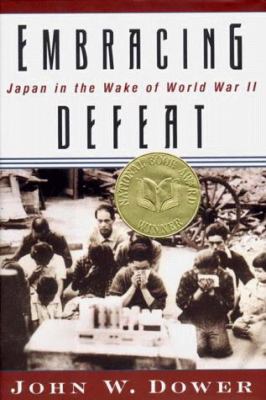
by John W. Dower
Library Journal Dower's magisterial narrative eloquently tells the story of the postwar occupation of Japan by departing from the usual practice of making the story part of General MacArthur's biography and instead focusing on the citizens. With historical sweep and cultural nuance, and using numerous personal stories of survival, loss, and rededication, he follows the astonishing social transformation of a people. (LJ 4/1/99) Copyright 2000 Cahners Business Information. Copyright © Reed Business Information, a division of Reed Elsevier Inc. All rights reserved. Publishers Weekly The writing of history doesn't get much better than this. MIT professor Dower (author of the NBCC Award-winning War Without Mercy) offers a dazzling political and social history of how postwar Japan evolved with stunning speed into a unique hybrid of Western innovation and Japanese tradition. The American occupation of Japan (1945-1952) saw the once fiercely militarist island nation transformed into a democracy constitutionally prohibited from deploying military forces abroad. The occupation was fraught with irony as Americans, motivated by what they saw as their Christian duty to uplift a barbarian race, attempted to impose democracy through autocratic military rule. Dower manages to convey the full extent of both American self-righteousness and visionary idealism. The first years of occupation saw the extension of rights to women, organized labor and other previously excluded groups. Later, the exigencies of the emergent Cold War led to American-backed "anti-Red" purges, pro-business policies and the partial reconstruction of the Japanese military. Dower demonstrates an impressive mastery of voluminous sources, both American and Japanese, and he deftly situates the political story within a rich cultural context. His digressions into Japanese cultureÄhigh and low, elite and popularÄare revealing and extremely well written. The book is most remarkable, however, for the way Dower judiciously explores the complex moral and political issues raised by America's effort to rebuild and refashion a defeated adversaryÄand Japan's ambivalent response to that embrace. Illustrations. (Mar.) Copyright © Reed Business Information, a division of Reed Elsevier Inc. All rights reserved. Library Journal Conventional histories treat the U.S. occupation of Japan (1945-52) as an exercise in which benevolent Americans conferred the blessings of democracy on the defeated feudal fascist foe. The persona of Gen. Douglas MacArthur looms large in such accounts, and the focus is usually on American policies. Dower's approach is very different. He transports us inside Japan to experience this brief but vital period of modern Japanese history in all its richness and complexity. Poignant scenes of trauma, degradation, bewilderment, and poverty alternate with those of hope, initiative, energy, and creativity as Japanese from many walks of life seized the opportunity to regenerate their own society along more egalitarian and democratic lines. In re-creating the American occupation as a Japanese experience, Dower (War Without Mercy, LJ 4/1/86) has produced nothing less than a masterpiece of modern history. Erudition, empathy, accessibility, dry humor, and narrative power combine to make this book an important and beautifully written work that belongs in all libraries.ÄSteven I. Levine, Boulder Run Research, Hillsborough, NC Copyright © Reed Business Information, a division of Reed Elsevier Inc. All rights reserved. Book list The tension between change and continuity is most sharply drawn in a revolutionary situation. Japan faced one following surrender, knowing that the Americans would up-end Japanese society and government as promised by the Potsdam Declaration. The details were left to the American proconsul, Douglas MacArthur. Would he pin war responsibility on Hirohito? No, a famous photo of the two emphatically symbolized. The details of the decision to protect Hirohito would have been scandalous, Dower notes, had they been publicized at the time. His study of the occupation era capably explains the Americans' imposition of a constitution that was the last, and generally overlooked, great project of liberal New Dealers. Japan's conservative political elite hated the changes, though elsewhere Dower contrasts the populace's more differentiated reaction to the top-down revolution. Dower's theme of acceptance versus resistance to change emerges clearly from his surveys of the postwar cultural and political scene (including an acidic appraisal of the war crimes trials), and his book will enhance most World War II collections. --Gilbert Taylor From Booklist, Copyright © American Library Association. Used with permission. |